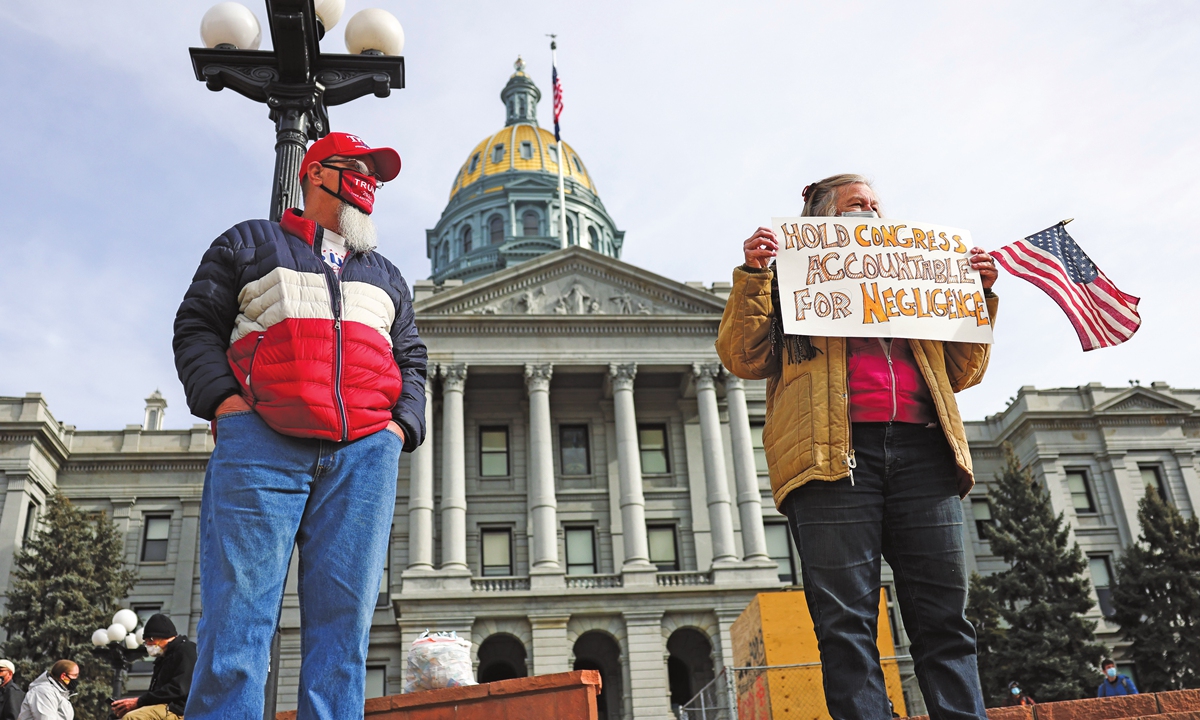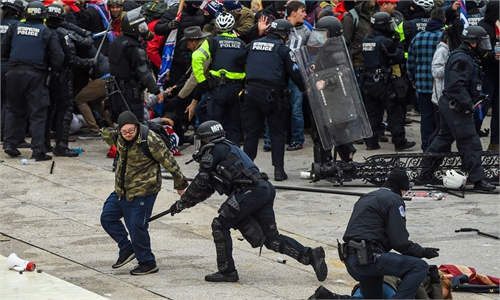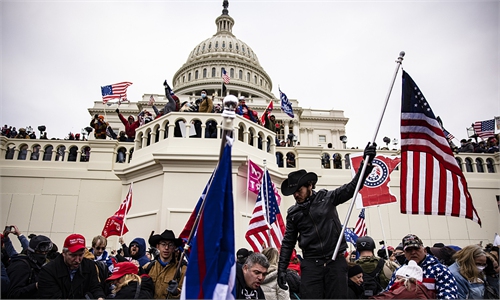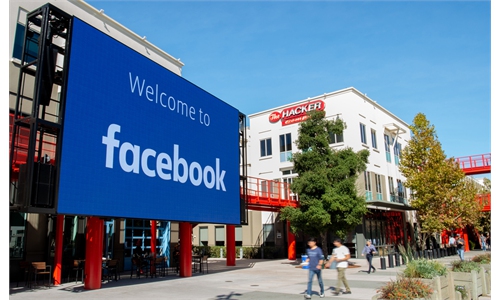Pessimism persists despite well-intentioned initiatives to bridge US social divisions
After the violent storming of the US Capitol building ahead of President-elect Joe Biden's inauguration, thousands of Americans say they are ready to reach across to "the other side" - but many deem the bad blood too much to overcome.
As fears mounted last week over the possibility of fresh violence, the organization Braver Angels - a group created in 2016 aimed at overcoming divisions - held a virtual meeting open to all those wishing to "unite America."
The Zoom call brought together some 4,500 participants from across the nation and gained more than 2,000 new adherents to the group, said spokesperson Ciaran O'Connor, all hoping to avoid a "civil war."

The meeting offered a moment for people who consider themselves "blue" (Democratic) or "red" (Republican) to see examples of how bridging divisions can be done.
Kouhyar Mostashfi, a person who identifies as Muslim and leans left, along with Greg Smith, a pro-Donald Trump former cop and fervent Christian, recounted the relationship they had forged for four years with discussions, humor, and visits to one's mosque and the other's church.
After the pandemic reduced their meetings to virtual exchanges, their relationship appears to have stood strong even following the events at the Capitol, which Smith described as "horrendous" and against his Christian faith.
Carlos Hernandez, a pro-Trump Latino, and Amania Drane, a black anti-racist activist, have been exchanging views for several months, explaining how they discovered how important it was to fight "our inner polarization" by "starting with self."
Gloomy prospects
It's one of several initiatives, local and national, promoting dialogue between people holding divergent views, like "Living Room Conversations," created in 2010.
Such groups have multiplied during the Trump presidency, which has split families and friends for some time. But how much can such efforts accomplish when facing extremes, in a fraught sociopolitical climate fueled by vitriol online?
The violence at the Capitol had some Trump supporters calling for a blacklist of those who invaded the building on January 6, while others dubbed the arrest of rioters and closure of conservative internet platforms as evidence of a totalitarian state.
Biden - who won 81 million votes against Trump's 74 million - is presenting himself as a figure of reconciliation. But some Americans appear pessimistic: About 56 percent expect divisions to persist under the Biden administration, and only 31 percent believe he can "unite the country," according to a recent Quinnipiac poll.
'Tribal' allegiances
According to Kai Ruggeri, a Columbia University professor who coauthored a 2019 study on polarization, the people who participate in outreach efforts "are not the people that are causing conflict at the highest levels."
"If they don't get those programs in front of the places where the problems exist, then I don't see much" impact, he said.
His study does suggest, however, that polarization can be reduced with less politicization of key issues.
"There's this overstated belief that we're just so far apart on every possible issue when the reality is there's a smaller number of ones that we are pretty divided on, but the vast majority, we actually are quite clear on," Ruggeri said.
"But we don't focus on those."
Robert Talisse, a political philosopher at Vanderbilt University, holds that "liberal and conservative citizens are no more divided over the policy questions than they were 30 years ago."
What's changed, he says, is that Americans "dislike each other more."
"The animosity to the other side has intensified in a way that far outstrips any actual policy divisions."
That animosity is exacerbated by a heightening "tribal" sensibility, he says, noting that each "tribe" has its values, modes of consumption, and fewer and fewer opportunities to encounter the other side.
"Our social spaces, our workplaces, where we shop, how we vacation... have all become segregated along partisan lines in ways that aren't always obvious," Talisse said.
So "our everyday casual and unplanned interactions with other human beings tend to put us in touch only with people who are kind of like ourselves."
Social media has been fueling such tensions for years, and the pandemic - which for 10 months has reduced in-person interactions - is only reinforcing the division.
"I don't think any politician can fix that. I think that it falls to us as citizens to recognize these forces at work in our society," Talisse said.
"I think that if we're going to repair democracy, we have to learn to do things together that are cooperative and social and are not organized around politics."
As fears mounted last week over the possibility of fresh violence, the organization Braver Angels - a group created in 2016 aimed at overcoming divisions - held a virtual meeting open to all those wishing to "unite America."
The Zoom call brought together some 4,500 participants from across the nation and gained more than 2,000 new adherents to the group, said spokesperson Ciaran O'Connor, all hoping to avoid a "civil war."

A few people protest the results of the election outside the Colorado State Capitol in Denver, Colorado, the US, on Sunday. Photo: AFP
The meeting offered a moment for people who consider themselves "blue" (Democratic) or "red" (Republican) to see examples of how bridging divisions can be done.
Kouhyar Mostashfi, a person who identifies as Muslim and leans left, along with Greg Smith, a pro-Donald Trump former cop and fervent Christian, recounted the relationship they had forged for four years with discussions, humor, and visits to one's mosque and the other's church.
After the pandemic reduced their meetings to virtual exchanges, their relationship appears to have stood strong even following the events at the Capitol, which Smith described as "horrendous" and against his Christian faith.
Carlos Hernandez, a pro-Trump Latino, and Amania Drane, a black anti-racist activist, have been exchanging views for several months, explaining how they discovered how important it was to fight "our inner polarization" by "starting with self."
Gloomy prospects
It's one of several initiatives, local and national, promoting dialogue between people holding divergent views, like "Living Room Conversations," created in 2010.
Such groups have multiplied during the Trump presidency, which has split families and friends for some time. But how much can such efforts accomplish when facing extremes, in a fraught sociopolitical climate fueled by vitriol online?
The violence at the Capitol had some Trump supporters calling for a blacklist of those who invaded the building on January 6, while others dubbed the arrest of rioters and closure of conservative internet platforms as evidence of a totalitarian state.
Biden - who won 81 million votes against Trump's 74 million - is presenting himself as a figure of reconciliation. But some Americans appear pessimistic: About 56 percent expect divisions to persist under the Biden administration, and only 31 percent believe he can "unite the country," according to a recent Quinnipiac poll.
'Tribal' allegiances
According to Kai Ruggeri, a Columbia University professor who coauthored a 2019 study on polarization, the people who participate in outreach efforts "are not the people that are causing conflict at the highest levels."
"If they don't get those programs in front of the places where the problems exist, then I don't see much" impact, he said.
His study does suggest, however, that polarization can be reduced with less politicization of key issues.
"There's this overstated belief that we're just so far apart on every possible issue when the reality is there's a smaller number of ones that we are pretty divided on, but the vast majority, we actually are quite clear on," Ruggeri said.
"But we don't focus on those."
Robert Talisse, a political philosopher at Vanderbilt University, holds that "liberal and conservative citizens are no more divided over the policy questions than they were 30 years ago."
What's changed, he says, is that Americans "dislike each other more."
"The animosity to the other side has intensified in a way that far outstrips any actual policy divisions."
That animosity is exacerbated by a heightening "tribal" sensibility, he says, noting that each "tribe" has its values, modes of consumption, and fewer and fewer opportunities to encounter the other side.
"Our social spaces, our workplaces, where we shop, how we vacation... have all become segregated along partisan lines in ways that aren't always obvious," Talisse said.
So "our everyday casual and unplanned interactions with other human beings tend to put us in touch only with people who are kind of like ourselves."
Social media has been fueling such tensions for years, and the pandemic - which for 10 months has reduced in-person interactions - is only reinforcing the division.
"I don't think any politician can fix that. I think that it falls to us as citizens to recognize these forces at work in our society," Talisse said.
"I think that if we're going to repair democracy, we have to learn to do things together that are cooperative and social and are not organized around politics."



